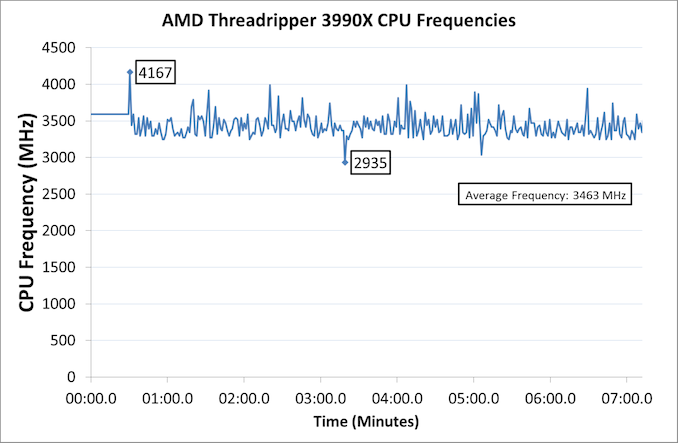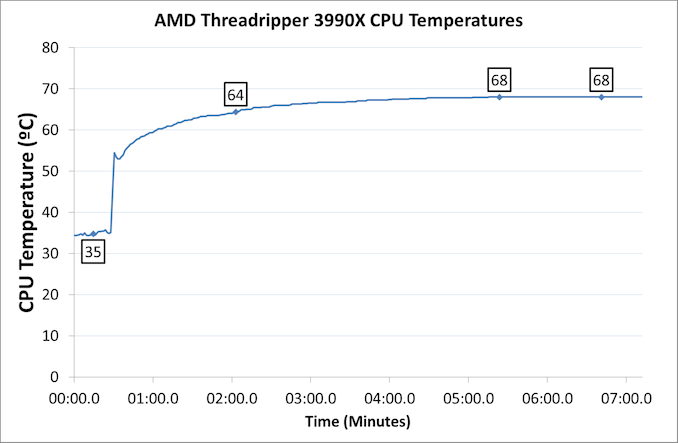The 64 Core Threadripper 3990X CPU Review: In The Midst Of Chaos, AMD Seeks Opportunity
by Dr. Ian Cutress & Gavin Bonshor on February 7, 2020 9:00 AM ESTFrequency, Temperature, and Power
A lot of questions will be asked about the frequency, temperature, and power of this chip: splitting 280W across all the cores might result in a low all-core frequency and require a super high current draw, or given recent reports of AMD CPUs not meeting their rated turbo frequencies. We wanted to put our data right here in the front half of the review to address this straight away.
We kept this test simple – we used our new NAMD benchmark, a molecular dynamics compute solver, which is an example workload for a system with this many cores. It’s a heavy all-core load that continually cycles around the ApoA1 test simulating as many picoseconds of molecular movement as possible. We run a frequency and thermal logger, left the system idle for 30 seconds to reach an idle steady state, and then fired up the benchmark until a steady state was reached.
For the frequencies we saw an ‘idle’ of ~3600 MHz, which then spiked to 4167 MHz when the test began, and average 3463 MHz across all cores over the first 6 minutes or so of the test. We saw a frequency low point of 2935 MHz, however in this context it’s the average that matters.
For thermals on the same benchmark, using our Thermaltake Riing 360 closed loop liquid cooler, we saw 35ºC reported on the CPU at idle, which rose to 64ºC after 90 seconds or so, and a steady state after five minutes at 68ºC. This is an ideal scenario, due to the system being on an open test bed, but the thing to note here is that despite the high overall power of the CPU, the power per core is not that high.
This is our usual test suite for per-core power, however I’ve condensed it horizontally as having all 64 cores is a bit much. At the low loads, we’re seeing the first few cores take 8-10W of power each, for 4.35 GHz, however at the other end of the scale, the CPUs are barely touching 3.0 W each, for 3.45 GHz. At this end of the spectrum, we’re definitely seeing AMD’s Zen 2 cores perform at a very efficient point, and that’s even without all 280 W, given that around 80-90W is required for the chipset and inter-chip infinity fabric: all 64 cores, running at almost 3.5 GHz, for around 200W. From this data, we need at least 20 cores active in order to hit the full 280W of the processor.
We can compare these values to other AMD Threadripper processors, as well as the high-end Ryzens:
| AMD Power/Frequency Comparison | |||||||
| AnandTech | Cores | CPU TDP | 1-Core Power |
1-Core Freq |
Full Load Power/core |
Full Load Freq |
|
| 3990X | 64 | 280 W | 10.4 W | 4350 | 3.0 W | 3450 | |
| 3970X | 32 | 280 W | 13.0 W | 4310 | 7.0 W | 3810 | |
| 3960X | 24 | 280 W | 13.5 W | 4400 | 8.6 W | 3950 | |
| 3950X | 16 | 105 W | 18.3 W | 4450 | 7.1 W | 3885 | |
The 3990X exhibits a much lower power-per-core value than any of the other CPUs, which means a lower per-core frequency, but it isn’t all that far off at all: less than half the power for only 400 MHz less. This is where the real efficiency of these CPUs comes into play.













279 Comments
View All Comments
Reflex - Saturday, February 8, 2020 - link
That's not really the main bottleneck these days, I can fully saturate all 8 cores/16 threads on my existing Ryzen with jobs in Handbrake. That means the CPU is still the main bottleneck. That still seems to be the case even at 64/128, so again it's not I/O or disk although those do need improvement for other tasks.PCIe 5 is on the way and will help. Faster forms of storage memory are coming, Optane and so on even if its happening in fits and starts. Intel and AMD don't own that, and can only take responsibility for the parts they do own, primarily the CPU and chipset, and both are doing well there (especially AMD lately).
HStewart - Sunday, February 9, 2020 - link
Still even with PCIe 5, I believe the application has single access to storage device.Handbrake is pure example of this one you missing the IO of reading the Optical drive in that case.
A simple search on Internet including Handbreak forums shows that Handle does not handle more 6 cores correctly.
Reflex - Sunday, February 9, 2020 - link
Uh, again I'm saturating all 8 cores and 16 threads. I have friends using Threadrippers to saturate far more cores than that. Handbrake goes beyond six cores easily.And who gives a damn about the IO of an optical drive? Who is using optical drives for this type of work? Do you even know how this software works and what its for? I'm working on large encoded files sitting on SSD's and encoding them in a target format. There is literally no I/O bottleneck there, most of the work is on the CPU, not the drive itself where I simply need to be able to read the start state and write the results as fast as the CPU can do the encoding.
Seriously, there are a ton of workloads that aren't I/O limited, in fact most are not.
Korguz - Monday, February 10, 2020 - link
reflex.. just give up.. hstewart will keep trying to argue his point has being right, while not having any tangible proof other then his own words.HStewart - Saturday, February 8, 2020 - link
This question is not in specific response to this cpu - but in general when more cores are added to system.Korguz - Saturday, February 8, 2020 - link
so that would also include intel systems, right ? hstewart ?Xyler94 - Monday, February 10, 2020 - link
No, Intel has the ultra super special *Insert random CPU extension* that mitigates any and all bad from adding more cores. Gosh, can't you tell?DannyH246 - Friday, February 7, 2020 - link
So a 4k chip absolutely obliterates 20k's worth of chips from Intel, yet apparently it's overpriced. LOLOLOL Intel and their fanboys are funny.dwade123 - Friday, February 7, 2020 - link
This tard is a good example of what a blind fanboy looks like. Only hyping and not buying, whereas actual potential TR buyers got priced out of the game by AMD. X399 owners are forced to migrate to peasant AM4 due to high prices lolIrata - Friday, February 7, 2020 - link
It appears you made a typo when you tried to post on wccftech.